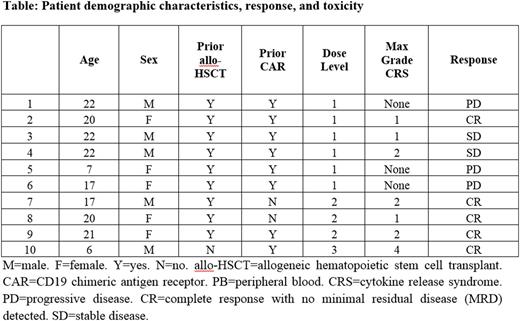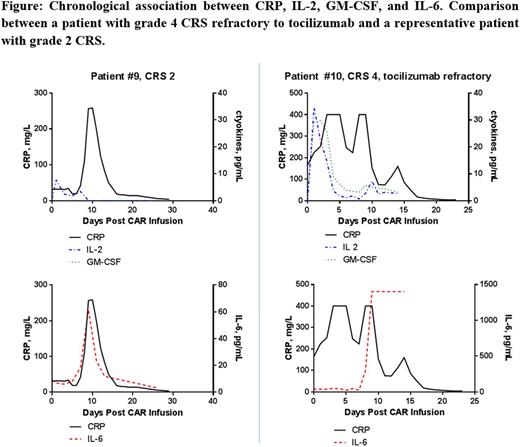Abstract
Background: Cytokine release syndrome (CRS) in the setting of CAR T cell therapy manifests as a wide constellation of symptoms with multi-organ involvement. CRS can vary from a mild, self-limited course to a life-threatening systemic inflammatory response which, in severe cases, may be associated with manifestations similar to those seen in hemophagocytic lymphohistiocytosis (HLH). Tocilizumab, an anti-human IL-6 receptor antibody, has become a widely accepted pharmacologic intervention of first choice in severe CRS based on the observation of elevated levels of inflammatory cytokines, most notably interleukin (IL)-6 and interferon (IFN)-γ. Indeed, following administration of tocilizumab, most patients show rapid signs of improvement. However, in rare circumstances, CRS may be refractory to tocilizumab, and repeat administration or institution of additional immunosuppression is needed. Here we summarize cytokine profiles and CRS seen in patients treated with anti-CD22-CAR T cells and propose tocilizumab-refractory CRS as a potentially distinct pathophysiological entity from typical CRS that may merit alternative immunosuppressive interventions other than tocilizumab.
Methods: Children and young adults with relapsed/refractory CD22+ ALL were treated with anti-CD22 CAR T cells. Serial samples for serum cytokine levels (IFN-γ, IL-6, IL-2, IL-10, IL-12p70, IL-1β, IL-15, IL-13, IL-4, IL-8, TNF-α, GM-CSF, MIP1-α) were obtained at pre-specified time points (0, 12, 24, 48, 72 hours, then daily on days 4 - 14 and 28 following CAR T cell infusion). Transduced CAR T cell dosage ranged from 3x10e5 cells/kg (dose level [DL] 1), 1x10e6 cells/kg (DL2), and 3x10e6 cells/kg (DL3). CRS severity was determined according to recently proposed grading system (Lee DW et al., Blood. 2014). Disease burden was assessed using standard morphology and flow cytometry analysis of bone marrow and peripheral blood samples.
Results: Cytokine profiles are available on 10 patients treated: first 9 patients enrolled in our phase I trial (NCT02315612), and the tenth patient was treated off-protocol on an emergency investigational new drug protocol given lack of alternative treatment option for rapidly progressing disease. All subjects, median age 20 years (range, 6-22 years), had a diagnosis of multiply relapsed ALL. Seven of 10 subjects developed CRS. Five subjects with CRS were complete responders to CAR therapy (Table). The median time to the onset of CRS was 9 days (range, 7-12 days) post-infusion and resolved within 1 week with supportive care alone except in one patient who received pharmacologic intervention for grade 4 CRS. Rise in C-reactive protein (CRP) tended to correlate with clinical severity of CRS. Chronological changes in the level of IFN-γ, IL-6, IL-1β, IL-8, TNF-α, and MIP1-α generally mirrored the CRP trend, typically preceding CRP change by 1-2 days.
In contrast to the CRS (maximum grade 2) seen in the first 9 patients, the 10th patient treated at DL3 developed grade 4 CRS with manifestations characteristic of HLH unresponsive to tocilizumab. Cytokine profile for this patient, compared to those of other CRS patients, was notable for a substantially higher serum IL-2 (35 pg/mL vs median 6.1 (range, 1.2-13.5)) and GM-CSF level (28 pg/mL vs median 1.0 (range, 0-6.1)) at 12 hours post infusion. Subsequent CRP elevation was not initially accompanied by a rise in IL-6 as in other patients, which may have explained the lack of response to tocilizumab (Figure). Evaluation for a genetic cause of HLH did not reveal any mutations (PRF1, MUNC13-4, RAB27A, STX11, STXBP2). Although this patient was a complete responder to therapy, the clinical course was complicated by pre-existing respiratory compromise and bacteremia, which may have contributed to increased CAR toxicity with variability in the cytokine profile.
Conclusion: Based on our early experience, we postulate that patients with an early increase in GM-CSF and IL-2 may potentially experience more atypical and severe CRS, which without a concomitant rise in IL-6, may not respond to tocilizumab and thus early intervention with other immunosuppression may be indicated. Analysis of larger numbers of patients is required to better delineate clinical confounders and to develop rational pharmacological approach to CAR-mediated inflammatory responses. Ongoing efforts are underway to further analyze clinical samples for biomarkers.
Mackall:NCI: Patents & Royalties: B7H3 CAR.
Author notes
Asterisk with author names denotes non-ASH members.



This feature is available to Subscribers Only
Sign In or Create an Account Close Modal